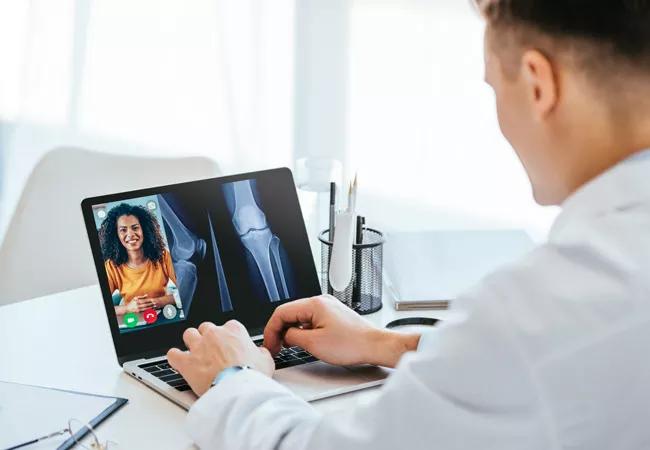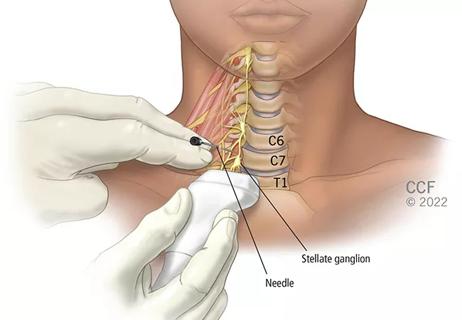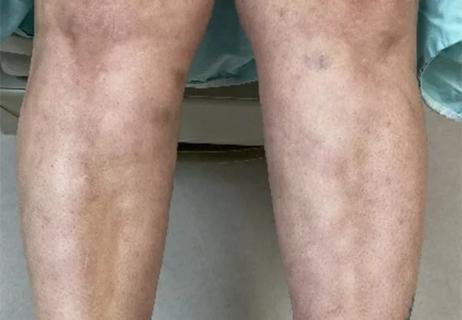A recently published framework illustrates Cleveland Clinic's strategy for integrating virtual care

Written by Dominic King, DO, FAOASM and Jonathan L. Schaffer, MD, MBA
Advertisement
Cleveland Clinic is a non-profit academic medical center. Advertising on our site helps support our mission. We do not endorse non-Cleveland Clinic products or services. Policy
The COVID-19 pandemic compelled us to think differently about the way patients access orthopaedic care and the ways in which we deliver that care. However, even prior to the pandemic, our team recognized that digital transformation must encompass several critical and emerging issues related to orthopaedic access, triage, treatment, education and retention. Central to our efforts, the Orthopaedic Informatics Working Group (OIWG) was formed as a collaborative effort to ensure that all the appropriate department stakeholder groups, including clinical subspecialty and administrative support teams, are represented. Our team recently published a framework for the responsible integration of musculoskeletal virtual care (MSKVC) in orthopaedic surgery.1
The demand for MSKVC is projected to substantially increase during and beyond the COVID-19 crisis. This is an opportunity to improve access for patients on a lower-cost platform while providing equivalent — or improved—safety and patient satisfaction as compared with the traditional face-to-face model of outpatient care. Incorporating MSKVC into all aspects of the delivery of care continuum is the challenge, and our teams are addressing this in all episodes of care. The ability to adapt to a new model will be essential for musculoskeletal clinical teams as well as organizations as established paradigms are shaken from their foundation and transformed.
OIWG has developed a strategy for integrating MSKVC as an underlying theme across all new innovations involving the clinical transformation of our department. The following overview highlights several MSKVC, Orthopaedic Informatics and Clinical Transformation projects to optimize and enhance access to and delivery of the care we provide in the Department of Orthopaedic Surgery. The OIWG is always soliciting ideas for opportunities to improve the orthopaedic episode of care. We are eager to continue integrating this initiative into our platform with the goal of providing the highest quality of care to our patients.
Advertisement
| Web Scheduling Triage and Access Tool (WebSTAT) | Online patient (or parent) self-scheduling for an in-person or virtual visit with the most appropriate provider. Virtual visit and in-person scheduling is live for pediatric fractures clevelandclinic.org/pediatricfracture or care with our pediatric orthopaedic surgery team. |
|---|---|
| Musculoskeletal Virtual Triage Channel (MSK VTC) | Live, interprofessional triage for our primary care community. Orthopaedic clinical and administrative support ensures that patient appointments are made in real-time, some even for the same day, providing a higher level of service and an opportunity to improve patient satisfaction. Staffed from the start of the clinical day until the early evening to provide services when needed by referring clinicians. |
| Physical exam documentation templates | Transformational shift in the way we collect physical examination data in our notes while also creating a data collection system for outcomes studies. Ability to create macros for physical examinations, both in-person and virtually. |
| Orthopaedic appointment | Ability for patients to automatically be offered sooner appointments directly through our patient portal with no human interaction. |
| Communication tools | One repository for all departmental clinical operations information. Informatics updates, leadership and educational podcasts and staff meeting video links, newsletters, and research, marketing and communications and quality updates. |
| TKA/THA care path transformation | A foundational technologic overhaul for the provider and patient with episode-of-care management documentation tools. Centralization of technologies from patient-entered data at specific points of the care, process to provider and wearable data streams. Most importantly, specific events can be automatically monitored to ensure completion at the appropriate time and help to complete assessments for patients scheduled for operative intervention. |
| Governance | As many of these efforts require coordination with our information technology colleagues who manage the enterprise electronic medical record and associated systems, alignment is key. The OIWG has been charged by departmental leadership with providing the internal coordination and management of the many varied requests to ensure optimal completion of the highest impact projects. |
| Web Scheduling Triage and Access Tool (WebSTAT) | |
| Musculoskeletal Virtual Triage Channel (MSK VTC) | |
| Online patient (or parent) self-scheduling for an in-person or virtual visit with the most appropriate provider. Virtual visit and in-person scheduling is live for pediatric fractures clevelandclinic.org/pediatricfracture or care with our pediatric orthopaedic surgery team. | |
| Live, interprofessional triage for our primary care community. Orthopaedic clinical and administrative support ensures that patient appointments are made in real-time, some even for the same day, providing a higher level of service and an opportunity to improve patient satisfaction. Staffed from the start of the clinical day until the early evening to provide services when needed by referring clinicians. | |
| Physical exam documentation templates | |
| Online patient (or parent) self-scheduling for an in-person or virtual visit with the most appropriate provider. Virtual visit and in-person scheduling is live for pediatric fractures clevelandclinic.org/pediatricfracture or care with our pediatric orthopaedic surgery team. | |
| Transformational shift in the way we collect physical examination data in our notes while also creating a data collection system for outcomes studies. Ability to create macros for physical examinations, both in-person and virtually. | |
| Orthopaedic appointment | |
| Online patient (or parent) self-scheduling for an in-person or virtual visit with the most appropriate provider. Virtual visit and in-person scheduling is live for pediatric fractures clevelandclinic.org/pediatricfracture or care with our pediatric orthopaedic surgery team. | |
| Ability for patients to automatically be offered sooner appointments directly through our patient portal with no human interaction. | |
| Communication tools | |
| Online patient (or parent) self-scheduling for an in-person or virtual visit with the most appropriate provider. Virtual visit and in-person scheduling is live for pediatric fractures clevelandclinic.org/pediatricfracture or care with our pediatric orthopaedic surgery team. | |
| One repository for all departmental clinical operations information. Informatics updates, leadership and educational podcasts and staff meeting video links, newsletters, and research, marketing and communications and quality updates. | |
| TKA/THA care path transformation | |
| Online patient (or parent) self-scheduling for an in-person or virtual visit with the most appropriate provider. Virtual visit and in-person scheduling is live for pediatric fractures clevelandclinic.org/pediatricfracture or care with our pediatric orthopaedic surgery team. | |
| A foundational technologic overhaul for the provider and patient with episode-of-care management documentation tools. Centralization of technologies from patient-entered data at specific points of the care, process to provider and wearable data streams. Most importantly, specific events can be automatically monitored to ensure completion at the appropriate time and help to complete assessments for patients scheduled for operative intervention. | |
| Governance | |
| Online patient (or parent) self-scheduling for an in-person or virtual visit with the most appropriate provider. Virtual visit and in-person scheduling is live for pediatric fractures clevelandclinic.org/pediatricfracture or care with our pediatric orthopaedic surgery team. | |
| As many of these efforts require coordination with our information technology colleagues who manage the enterprise electronic medical record and associated systems, alignment is key. The OIWG has been charged by departmental leadership with providing the internal coordination and management of the many varied requests to ensure optimal completion of the highest impact projects. |
The OIWG is always soliciting ideas for opportunities to improve the orthopaedic episode of care. We are eager to continue integrating this initiative into our platform with the goal of providing the highest quality of care for our patients.
Dr. King is a sports medicine physician in the Department of Orthopaedic Surgery, the manager of Orthopaedic Informatics, and the director of ORI Clinical Transformation. (Kingd2@ccf.org).
Dr. Schaffer is an adult reconstructive surgeon specializing in knee arthroplasty in the Department of Orthopaedic Surgery and Program Director for the Global MedAssist Program in International Operations (SchaffJ@ccf.org).
Reference
King, D., Emara, A.K., Ng, M.K., Evans, P.J., Estes, K., Spindler, K.P., Mroz, T., Patterson, B.M., Krebs, V.E., Pinney, S. and Piuzzi, N.S. and Schaffer, J.L.: Transformation from a traditional model to a virtual model of care in orthopaedic surgery: COVID-19 experience and beyond. Bone & Joint Open, 1:272-280, 2020.
Advertisement
Advertisement

Patients report improved sense of smell and taste

Clinicians who are accustomed to uncertainty can do well by patients

Unique skin changes can occur after infection or vaccine

Cleveland Clinic analysis suggests that obtaining care for the virus might reveal a previously undiagnosed condition

As the pandemic evolves, rheumatologists must continue to be mindful of most vulnerable patients

Early results suggest positive outcomes from COVID-19 PrEP treatment

Could the virus have caused the condition or triggered previously undiagnosed disease?

Five categories of cutaneous abnormalities are associated with COVID-19